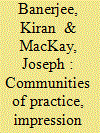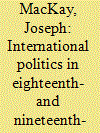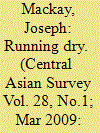|
|
|
Sort Order |
|
|
|
Items / Page
|
|
|
|
|
|
|
| Srl | Item |
| 1 |
ID:
142524


|
|
|
|
|
| Summary/Abstract |
What role do weaker actors play in determining the outcomes of irregular wars? The literature on counterinsurgency outcomes has tended to explain weak-side victory either as a result of informational asymmetries caused by constraints on counterinsurgent forces, or as a result of suboptimal strategic choices by the state. We suggest that this underplays the role of insurgents themselves; we attempt to “bring the insurgents back in,” giving variation in insurgent polity a role in explaining their own victories and defeats. In order to do so, we focus inductively on a relatively novel pool of cases: Great Britain's wars in India from the mid-eighteenth to early nineteenth centuries. Doing so allows us to hold the counterinsurgent side constant while evaluating variance among the insurgents themselves. We find that variance on the insurgent side is indeed significant in determining outcomes, and suggest possible reasons why this occurs.
|
|
|
|
|
|
|
|
|
|
|
|
|
|
|
|
| 2 |
ID:
175553


|
|
|
|
|
| Summary/Abstract |
Military attachés and wartime observers have received surprisingly little attention in international relations. Why do states exchange attachés, permitting uniformed foreigners to gather intelligence on their territory and during their wars? To explain, we adopt a broadly practice-theoretic approach, focusing on the individuals who developed the role by living it, showing how they both innovated a distinct military practice and established institutional legitimacy for attachés. We address an early historical case in which the practice proliferated: the Russo-Japanese War, throughout which observers represented multiple European states, on both sides of the conflict. Sometimes termed the first modern war, the conflict saw Japan's entry into the Eurocentric great power system. In this context, embedded attachés had a dual effect. On the one hand, a professional attaché community established itself: we show how local innovation by embedded officers, in the context of this structurally destabilising event, permitted the creation of a new institutional role that might otherwise have been impossible. On the other, the Japanese made use of the attachés as witnesses for Western governments, observing their performance of great power-hood, as they defeated Russia. The argument has implications for understanding both the military attaché system and communities of practice as such.
|
|
|
|
|
|
|
|
|
|
|
|
|
|
|
|
| 3 |
ID:
145704


|
|
|
|
|
| Summary/Abstract |
The use of ethnographic methods is on the rise in International Relations. However, research in this area has largely been constrained to critical or interpretive analysis of nontraditional objects of study. This has been driven in part by two practical problems that limit ethnographic analysis: that of aggregation, as international phenomena are necessarily large in scale, and that of access, as institutional settings are often closed or secretive. While we commend critical and nontraditional research for driving much-needed expansion of the disciplinary agenda, we offer a complementary account, arguing that scholars can also use ethnographic methods in explanatory research. To do so, we draw on two methodological literatures in anthropology. The first approximates ethnographic research through historical immersion. The second applies ethnographic methods at multiple research sites, tracking transnational phenomena across them. The paper sketches prospective studies of each kind, concerning the creation and implementation of the United Nations. While neither method is entirely new to IR, the methodological literatures in question have yet to receive systematic treatment in the field.
|
|
|
|
|
|
|
|
|
|
|
|
|
|
|
|
| 4 |
ID:
120729


|
|
|
|
|
| Publication |
2013.
|
| Summary/Abstract |
Using historical analysis of relations between city-states and other international actors in Central Asia during the eighteenth and nineteenth centuries, this article evaluates new structural theories of international politics, chiefly those of David Lake and Jack Donnelly. Pre-colonial Central Asia offers a usefully tough case for structural theories, since it so little resembles the modern international order that these theories were developed to describe. Empirically, the article proceeds by evaluating the region's city-states' relations with three groups of actors: one another; neighbouring empires; and the many non-state actors present at the time. It concludes with an assessment of the merits of the new structuralisms, and a discussion of their value for constructivist international-relations theories of international change.
|
|
|
|
|
|
|
|
|
|
|
|
|
|
|
|
| 5 |
ID:
168559


|
|
|
|
|
| Summary/Abstract |
How do hierarchical cores or metropoles legitimate their influence or rule? How do their approaches to legitimation inform resistance? This theory note rethinks how legitimation operates in hierarchies, with a focus on variation in cores’ legitimation strategies. I argue that varying claims to hierarchical legitimacy shape both action at the core and resistance at the periphery. I develop a four-part typology of legitimation strategies, differentiated along two axes. On the first, cores may be universalist, recognizing no legitimate equals, or competitive, recognizing other cores as peer rivals. On the second, they may chiefly innovate legitimacy claims internally, drawing them from their own political traditions, or externally, borrowing the claims of others. These strategies shape available options for revisionism by rivals and resistance by hierarchical subordinates. I illustrate with historical examples.
|
|
|
|
|
|
|
|
|
|
|
|
|
|
|
|
| 6 |
ID:
145511


|
|
|
|
|
| Summary/Abstract |
A growing literature in IR addresses the historical international politics of East Asia prior to Western influence. However, this literature has taken little note of the role of Eurasian steppe societies and empires in these dynamics. This article offers a corrective, showing that relations between China and the steppe played an important role in regional politics. I argue that Chinese elite conceptions of the steppe as other played an important role in maintaining China’s ontological security. Imperial Chinese elites pursued a deliberate strategy of ‘othering’ steppe societies, presenting them as China’s political-cultural opposite. Doing so both provided a source of stable identity to China and justified their exclusion from the Chinese ‘world order’. Empirically, I proceed in three sections. First, I consider Chinese identity building, framed in terms of ontological security, both under the founding Qin and Han dynasties, and under the later Ming dynasty. Second, I address recent historiography of the steppe, showing Chinese conceptions of it were inaccurate. Third, I address the long history of hybridity between the two regions.
|
|
|
|
|
|
|
|
|
|
|
|
|
|
|
|
| 7 |
ID:
168804


|
|
|
|
|
| Summary/Abstract |
International relations (IR) has seen a proliferation of recent research on both international hierarchies as such and on historical IR in (often hierarchical) East Asia. This article takes stock of insights from East Asian hierarchies for the study of international hierarchy as such. I argue for and defend an explanatory approach emphasizing repertoires or toolkits of hierarchical super- and subordination. Historical hierarchies surrounding China took multiple dynastic forms. I emphasize two dimensions of variation. First, hierarchy-building occurs in dialogue between cores and peripheries. Variation in these relationships proliferated multiple arrangements for hierarchical influence and rule. Second, Sinocentric hierarchies varied widely over time, in ways that suggest learning. Successive Chinese dynasties both emulated the successes and avoided the pitfalls of the past, adapting their ideologies and strategies for rule to varying circumstances by recombining past political repertoires to build new ones. Taken together, these phenomena suggest new lines of inquiry for research on hierarchies in IR.
|
|
|
|
|
|
|
|
|
|
|
|
|
|
|
|
| 8 |
ID:
087681


|
|
|
|
|
| Publication |
2009.
|
| Summary/Abstract |
The Aral Sea disaster is the result of Soviet-era irrigation policy. The collapse of the Soviet Union left the issue under the purview of international law. This essay addresses how this shift has affected attempts to slow or reverse the sea's depletion. Treaties on the non-navigation use of international watercourses and on the prevention of desertification have had little effect. While a number of regional instruments and arrangements have been brought to bear, they have also done little to reverse damage to the sea. Finally, attempts to regulate the issue through domestic law, as evidenced in the case of Kyrgyzstan, have done little as well. While some progress has recently been made under the auspices of the World Bank, it is not a result of international law. The conclusion is that the shift from domestic to international law has little improved the situation, and may have made matters worse.
|
|
|
|
|
|
|
|
|
|
|
|
|
|
|
|
| 9 |
ID:
160565


|
|
|
|
|
| Summary/Abstract |
Why is there no reactionary international theory? International relations has long drawn on a range of traditions in political thought. However, no current, or even recent, major school of international-relations theory embraces reactionary doctrine. This is more surprising than some might assume. Reaction was once common in the field and is now increasingly common in world politics. In this note, we define reaction and show that no active and influential school of international-relations theory falls within its ideological domain. Nonetheless, reactionary ideas once deeply shaped the field. We identify two distinct kinds of reactionary international politics and illustrate them empirically. We argue that the current lack of reactionary international relations undermines the field's ability to make sense both of its own history and of reactionary practice. Finally, we offer some preliminary thoughts about why reactionary ideas hold little sway in contemporary international-relations theory.
|
|
|
|
|
|
|
|
|
|
|
|
|
|
|
|
|
|
|
|
|